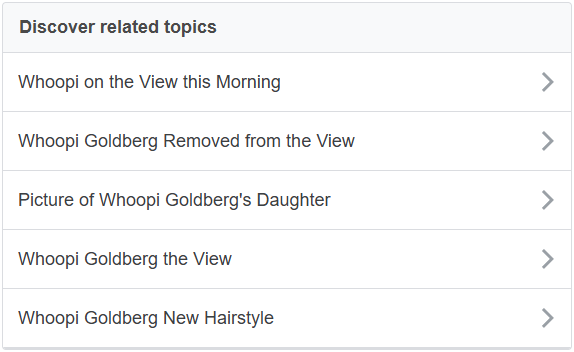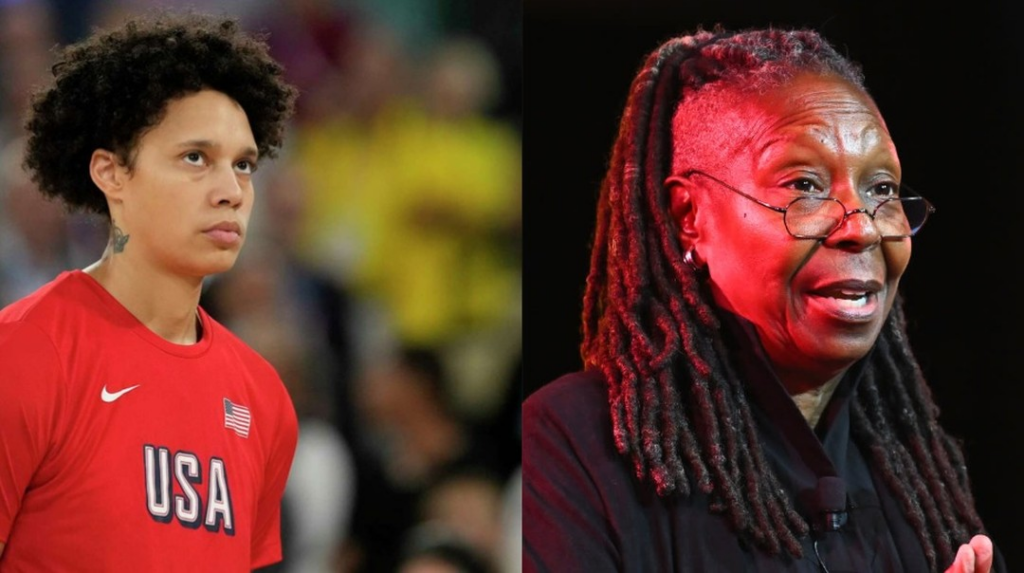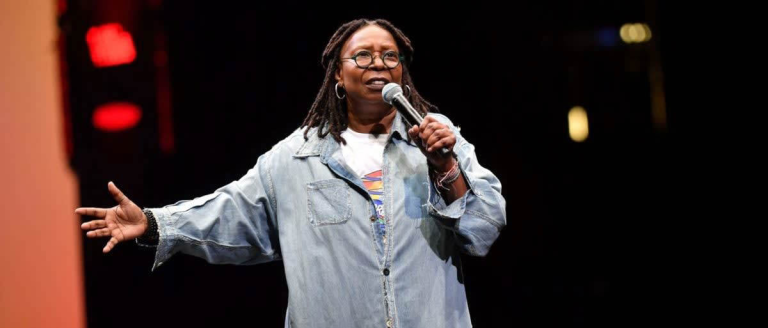Two iconic figures—actress, activist, and talk show host Whoopi Goldberg, alongside WNBA superstar Brittney Griner—have sparked a heated debate after revealing their plans to leave the United States. Both women have openly shared their frustrations, citing a sense of being undervalued and mistreated in a country they once proudly called home.
Their comments have stirred a wave of mixed reactions across the nation, highlighting the deepening cultural divide. Supporters rally behind their decision, asserting that outspoken celebrities and athletes often face unnecessary criticism, while others argue that the backlash is an exaggerated response to personal grievances.

Whoopi Goldberg Opens Up About America’s Hostility Toward Its Public Figures
Whoopi Goldberg has always been a vocal advocate for social justice, using her platform as an award-winning actress, comedian, and co-host of The View to tackle everything from racial inequality to political issues.
In light of the backlash faced by Brittney Griner after her return to the U.S. following her detainment in Russia, Goldberg has made her feelings clear—America no longer seems to appreciate its most exceptional individuals.
“Being extraordinary is punished, not celebrated,” Goldberg said in a recent interview. “Instead of lifting up those who excel, we tear them down. If Brittney leaves, I’ll go too.”
Her remarks have ignited a firestorm of debate, with some agreeing that public figures are often unfairly scrutinized, while others accuse her of overstating the issue.
Video: Brittney Griner discusses her efforts to help Americans still detained abroad.

Brittney Griner’s Legal Battles and the Backlash That Follows
Brittney Griner’s recent years have been marked by immense challenges. In 2022, the WNBA star was arrested in Russia on drug charges and sentenced to nearly nine years in prison. After months of tense diplomatic negotiations, the U.S. secured her release through a highly controversial prisoner swap.
While her return was celebrated by many, it also sparked significant backlash. Critics questioned the fairness of exchanging a convicted arms dealer for her freedom, and some even accused Griner of ingratitude when she spoke candidly about her struggles to readjust to life in the U.S.
Now, Griner’s comments about feeling unwelcome in her own country have only fueled the growing debate, with her critics and supporters clashing over her decision to speak out.

“I’ve given my all to this country, but it doesn’t always feel like it gives back,” Griner shared. “It’s exhausting to constantly defend myself.”
Her statement echoes a sentiment that resonates with many public figures—feeling under constant scrutiny rather than being celebrated for their achievements. Griner’s frustration reflects a larger cultural shift, as more and more individuals, especially those in the public eye, express their exhaustion with the lack of appreciation they receive despite their contributions.
The Bigger Picture: Is America Pushing Away Its Brightest Stars?

The controversy surrounding Whoopi Goldberg and Brittney Griner extends beyond just their personal experiences—it reflects a broader cultural divide in America. Many celebrities, athletes, and activists have faced intense backlash for expressing their beliefs, often being branded as unpatriotic or entitled simply for voicing their concerns.
This brings up a crucial question: Is America becoming a place where success and individuality are punished instead of celebrated?
Supporters of Goldberg and Griner contend that the U.S. has become increasingly hostile toward those who speak out for what they believe in. They point to examples like Colin Kaepernick, whose peaceful protest against racial injustice led to being blacklisted from the NFL, as evidence of how dissent is harshly treated.
On the other hand, critics argue that public figures like Goldberg and Griner are out of touch with the struggles of everyday Americans. Many believe that, rather than threatening to leave, celebrities and athletes should focus on using their platforms to address and improve the issues facing the country.
As expected, the internet has erupted with mixed opinions about Whoopi Goldberg and Brittney Griner’s remarks.
- Supporters argue that their frustration is justified.
“Whoopi is right—America should support its brightest stars, not tear them down. If they feel unwanted, why stay?” one social media user wrote. - Critics see their statements as dramatic and ungrateful.
“If you don’t love America, leave,” another user countered. “There are millions of people who would trade places with you in a heartbeat.”
This debate highlights the deep division in how Americans view patriotism, success, and freedom of speech.
Should They Stay or Should They Go?
This isn’t the first time celebrities have spoken about leaving the U.S. over social or political frustrations. Over the years, many high-profile figures have made similar statements—some followed through, while others stayed and continued advocating for change.
The core argument is whether leaving is the right solution.
- Those who support their potential departure argue that no one should feel forced to stay in a country where they don’t feel valued. Everyone has the right to seek happiness and safety wherever they choose.
- Those who oppose it believe that public figures should remain and use their platforms to enact positive change rather than abandoning their country.
This debate reflects a larger issue—how does a nation handle dissent from its most famous and influential figures?
A Defining Moment for America

Whoopi Goldberg and Brittney Griner’s statements have prompted Americans to grapple with critical questions about how the country treats its public figures, particularly those who dare to challenge societal norms.
Is America still a place where success is celebrated, or has it evolved into a battleground where the most talented and outspoken face constant scrutiny? Should celebrities and athletes choose to leave if they feel unwelcome, or is it their responsibility to stay and fight for progress from within?
One thing is clear—whether they stay or go, this conversation will continue to shape the national dialogue for years to come, forcing America to reflect on its values, its treatment of its heroes, and the future of freedom of expression in a divided society.